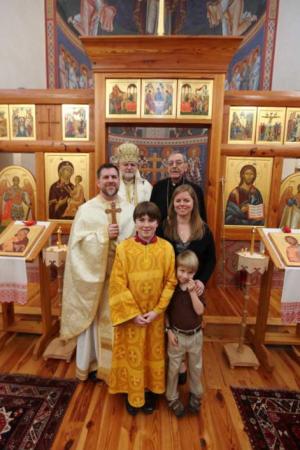“What is God’s will for my life?” This is a classic question, and one that I recall wrestling with from time to time in my life. Even more taxing and vexing were questions like, “Is it God’s will that I take this job?” or “Does God will that I date this person?” At one time in my life, these questions presupposed a particular approach to the path of discerning “God’s will.” It was as if His will were a secret which had to be decoded, and as if God would only reveal to us as much as we could either figure out on our own or pry out of Him.

Priest James Bozeman with wife Katie, sons Alex and Gabriel, and (from left) Bishop Mark and Bishop Nikon.
As a teenager, I became more and more desperate to figure out what God’s will was for me, largely because I wanted to make sure that I was doing everything “according to plan.” I found a book, the title of which now escapes me (it is probably better that I have forgotten it), and in this book the author suggested that God’s will was indeed a sort of code. We could crack that code simply by reading the words of the Bible literally and directly, and apply them to ourselves. Just open up the Bible and begin to read, and the words themselves will tell you exactly what to do. This was not so bad for me when I read passages that discussed virtuous activities, such as giving to the poor or spreading the Gospel. But I became more troubled trying to internalize Old Testament passages, some of which seemed to be directing me to sacrifice animals or kill my neighbors in battle. What did any of that stuff have to do with decoding God’s will?
Why did God have to be so secretive about what He wanted me to do? Why couldn’t He simply speak to me as He did to so many others that we read about in the Scripture? And if God was going to be secretive about what His plan for me was, then how could I be blamed if I somehow missed my God-preordained path due to my ignorance and God’s subtle caginess?
I’m fairly certain that I am not the only person who has suffered in a pursuit to decode God’s seemingly elusive will. For me, this was a mistake based on some erroneous assumptions about the fact of God’s will in our lives: as if there is one – and only one – vocation for each of us, and unless we hit all the stops along the road at the right time and in the right order, we are going to miss it.
There are two sides to this troubling coin: on one side, we are vexed whenever we find ourselves at a loss to understand what God’s “secret” will for as actually is. On the other side is the convenient, tacit response that we are entitled to, after supposedly discerning His will: God told me to do this. So on the one hand we are in the dark, thinking that there is some path that we must find and follow. And on the other hand is the logical fallacy in which we appeal to the authority of God (also as an “appeal to Heaven” or deus vult). Who can argue with us – indeed, how can we argue against ourselves? – if we assert and believe that we are doing a particular thing because God has told us to do that thing?
It isn’t the purpose of this reflection to downplay the pain that some of us endure in our effort to understand exactly why we have been dealt the particular life that we live. Nor is it my intention cynically to rule out the possibility that God may send a very direct word of instruction to a person. I merely wish to affirm how incredibly free we are to live our lives. We are free to pursue the gifts that we discern (and others discern) in ourselves. We are frighteningly free, in fact. And with this freedom comes an even greater realization that all that we have in our lives – our gifts, talents, good and bad experiences and so on – are given to us by our Lord for our edification, to suffer and to enjoy.
And so in the end, there is no “secret code” of God’s will that needs to be cracked. Instead there is simply the incredible freedom to live holy and perfect lives in which we manifest those gifts and talents that our Lord bestows on all men and women in different proportions. In this case, God’s will is for us to offer up to him whatever we have been given, by His grace and to the best of our ability, echoing those words that we hear in each Divine Liturgy: “Thine own of Thine own, we offer unto Thee…”
In returning our gifts to the Giver of all, we no longer have a need to appeal to a God-made-me-do-it argument. We are free to give as little or as much of our lives to God as we desire. But we are compelled to consider how much or how little we are offering to God, and why we may be holding back a portion of ourselves. Likewise, we are equally compelled to remember that whatever we offer to God, it is always lacking and always in need of Him to make if perfect and complete. And so we humbly offer ourselves up, giving back to Him what is already His, asking Him to make perfect all that is imperfect in us.
Source: Wonder
You might also like:
Contemporary Monasticism, God’s Will, and Everyday Life: A Conversation with Archimandrite Tikhon
Fr. Calinic (Berger), Finding God’s Will for Your Life: Principles for Young Adults













